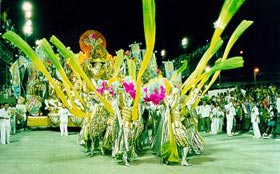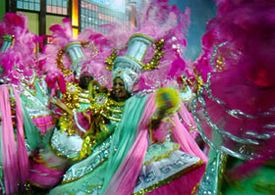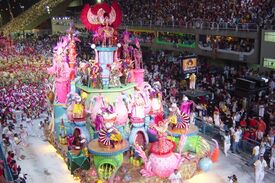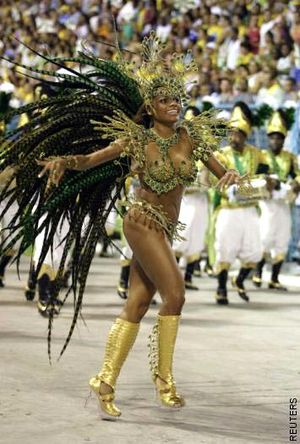كرنڤال ريو
كارنـِڤال ريو ده جانيرو هو أحد أعظم الاستعراضات على وجه الأرض. ريو ده جانيرو is known as the cultural capital of Brazil and was the administrative capital from 1822 to 1960, when Federal Government moved to the new capital, Brasilia. The first festivals of Rio date back to 1723.[1]
. . . . . . . . . . . . . . . . . . . . . . . . . . . . . . . . . . . . . . . . . . . . . . . . . . . . . . . . . . . . . . . . . . . . . . . . . . . . . . . . . . . . . . . . . . . . . . . . . . . . . . . . . . . . . . . . . . . . . . . . . . . . . . . . . . . . . . . . . . . . . . . . . . . . . . . . . . . . . . . . . . . . . . . .
الاستعراض
The famous carnival parade has been going on since the 1930s. The parade starts Sunday evening and continues into early morning Monday of the celebration. Until 1984, when it was moved to Av. Presidente Vargas, the parade took place at Praca Onze. In 1984 the parade finally found its permanent home, the Sambadrome ["sambódromo" in Portuguese]. The Sambadrome is a large structure that was built in the downtown area, which includes several buildings that make a circular open area in the middle. In the off season, the buildings of the Sambadrome are used as classrooms for the local public schools.[2]
مدارس السامبا



انظر أيضاً
| كرنڤال ريو
]].المصادر
- ^ Virtual-Brazil, Brazil Travel: Rio de Janeiro History, http://www.v-brazil.com/information/geography/rio-de-janeiro/history.html. April 1, 2007.
- ^ Ipanema, Carnival in Rio_de_Janeiro, http://www.ipanema.com/carnival/sambodro.htm. April 1, 2007.

